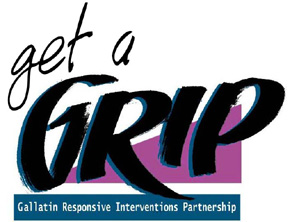|
|
|
|

|
When are fun and games anything but?
Get a GRIP! |
Gallatin Responsive Interventions Partnership (GRIP)
|
|
|
|
November 2006
Final issue . . .
What is addiction?
with working definitions from folks in
substance abuse treatment, health practitioners, and criminal justice
professionals.
|
 |
|
In this issue:
|
from
Jenna |
Dear Reader:
The SAMSHA (Substance Abuse and Mental Health Services
Administration) grant we had hoped for didn't come through.
For now, there aren't the resources to keep our e-zine in publication.
Thanks for the readership over the past years.
We'll keep the MAHp website posted through July of 2007, so those resources
will continue to be available. If a new grant has not come through by
then, those pages will be absorbed in to the Alcohol and Drug Services of
Gallatin County's website.
I continue as ADSGC's Prevention Writer and Webmaster. I'm doing more
freelance writing on my own -- and some healing work.
Sincerely,
Jenna Caplette
|
|
Addiction: Working Definitions |
Addiction: - The quality or condition of being addicted, especially to a
habit-forming
substance.
Addict: 2. To occupy or involve (oneself) habitually or compulsively.
� The American Heritage College Dictionary, 4th Addition.
My definition of addiction is: Whenever you have an uncontrollable urge to use
something even though you know its not good for you. It doesn�t have to be illegal
or immoral. It�s often about ingesting something but it can be about other addictive
behaviors. With food, quantity can be an addiction. � Mother of an alcoholic
Addiction is a loss of control. When a person can't cut down or cut back for
the long term. You might get in trouble with the law, family or friends but you
still don't stop. You make alibis and excuses for the destructive behavior. It's
where dysfunction runs your life and the addiction is a method to cope.- Melissa
Kelly, Director, Gallatin County Re-Entry Facility
Addiction is the lack of developed will . . . you've given your will over to an external
source. . . that has authority over your biology, your psychology. � Carolyn Myss,
Why People Can't Heal, from interview in Yoga Magazine, July/August 1997.
The best intentions in the world don't help you with addiction. . . Will power
is not a prognostic factor in recovery. Addiction resides in what is often
referred to as our reptilian brain, and -- well, alligators don't come when
they're called. � Dr. George Vaillant, M.D. Harvard Addictions researcher.
Such lovers, like all lovers, are of course obsessed with the object of their love.
They long for it, pine away when deprived of it, and think constantly about ways to
reunite with it. . . Everything is organized in a hierarchy on top of which the
beloved reigns supreme and secure and to which everything, absolutely everything
else is now subordinate. � Floyd P. Garrett, M.D. from "TheAddict�s Dilemma"
We need to develop a sense of being, the fact that 'we are' is more important
than what we do. An addict's history will tell them that it's best for them to
shut down; to live the life of the walking dead. . . Recovery "isn't just about
dealing with an addiction problem. It's about dealing with every day living
problems." � Jamie Martin, former addictions counselor. Butte.
Addiction: an extreme habit. It's a state that we consider to be normal. It's
what we're used to. You need to make a deep acknowledgement of the addiction, and that you're
choosing it. Empowering the individual is about telling them to grow as much as
they want, to learn as much as they want. To bring power, clarity, and "awakeness"
in to their lives. �
Kay Whitaker, author, Reluctant Shaman.
Change can be uncomfortable. Alcoholics know if they drink they feel better.
Alcoholics have learned to shut off their emotions and their heart with the
chemical. Change means moving into unfamiliar territory with no protection.
Emotions are unfamiliar and often "raw" without the chemical to numb them.
Change means moving out of the comfort zone and dealing with life on life�s
terms. � Alex Vukovich, WATCh Program Director
Restore vs. Recover:
When you recover, you return to a functioning state. You
may not, however, be as strong as you were before or have all the capacities you
had then. When you restore yourself, you return to your original state of health and
emotional balance or even improve upon it. � Isabel Parlett, from Distinctionary.
I suggest to you that the cause of alcohol and other drug abuse is a
combination of factors that is as diverse as every individual. Whether a
spiritual leader or police officer or counselor or physician or family member
starts the conversation is not nearly as important as the fact that this
conversation occurs across our communities. � Shelley Wickstrom, Pastor
|
|
Return to the top of
this page
|
Media Literacy: Presentations |
Media Literacy is the skill of analyzing television and mass media.
-Media Literacy teaches you to critically analyze and evaluate media.
-When taught to youth they may be less likely to adopt destructive attitudes. The staff at ADGSC and ARC have received intensive
training from Dr. Peter DeBeneditis in Media Literacy and would be happy to
present for your group or organization.
Learn more.
|
Resources & Web Links
As the Holiday Season Approaches . General Interest
. Health .
Subscribe to JTO News |
as the holiday season approaches. . .
-
Restoring the Joy of the Season.
An interview with GRIP Leadership Team member, Reverend Shelley Wickstrom.
- Alcohol and Stress.
Adapted for the Montana Alcohol Based health
Promotions Partnerships from a resource sheet developed by National Alcohol Screening Day.
General Interest
Health
Stay informed |
|
|
Top
of Page
Visit
GRIP's Home Page
|
|